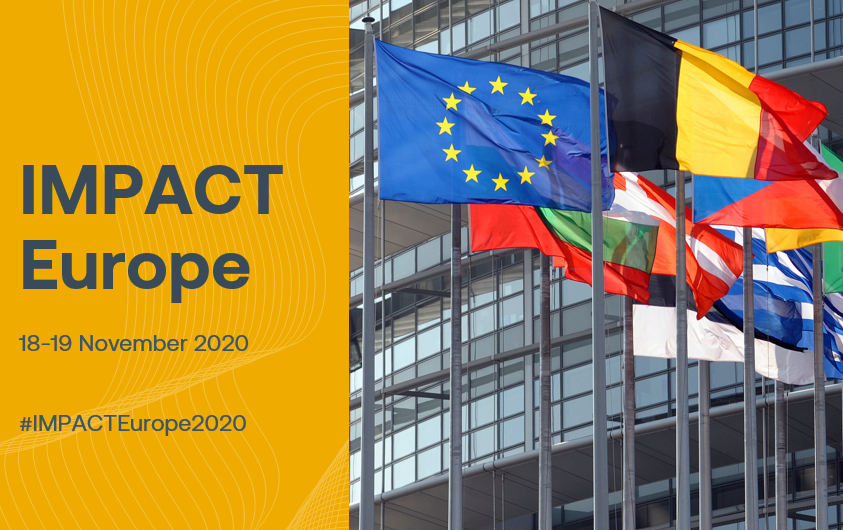IMPACT Europe 2020: IPC Members Gear Up for New Competitive Landscape
Senior executives from across the European electronics manufacturing value chain gathered virtually last week to meet European Commission officials and advocate for policies to ensure our sector’s competitiveness in a dynamic regulatory landscape.
IPC’s IMPACT EUROPE 2020 came at an important time, as the EU is ramping up consideration of new policies affecting international trade, industrial strategy, environmental policy, and corporate conduct. On top of an already ambitious 2021 agenda aimed at accelerating the region’s green and digital transitions, the EU’s COVID-recovery plans and new emphasis on “open strategic autonomy” bring new focus to global supply chains, how we manage our interdependencies, and how the region can build back sustainably. The meetings covered a range of key areas that are under review and/or set to launch.
Day 1 kicked off with Peter Kovacs with the European Commission’s Directorate-General for Trade (DG Trade), who provided context for the current EU trade review, to which IPC has submitted a written contribution. Kovacs acknowledged the importance of “openness” in the EU’s trade stance, and he reiterated that Europe champions “free and fair trade” as a defender of the multilateral trading system. However, he also noted the EU’s imperative to learn from the COVID crisis and reduce supply chain dependencies. On China, Kovacs said the EU aims to improve market access as part of negotiations on investment rules, and for this, China “needs to move significantly.”
The next session focused on the EU’s industrial strategy. Szabolcs Szekacs from the European Commission’s DG GROW provided an update on developments post-COVID which are leading to new analysis of industrial ecosystems in Europe and how these can be further stimulated to ensure growth.
In the ensuing discussion, IPC emphasised that electronics manufacturing is not only a strategic ecosystem in its own right, but also a horizontal industry that supports many others. Thus, we urged the European Commission to gather input from our sector via a strategic forum that is being launched soon to work on industrial competitiveness in Europe.
To further highlight the strategic role of the electronics manufacturing industry in European competitiveness, we heard a presentation by Olivier Coulon from Decision, a consultancy contracted by IPC to provide a report on our industry in Europe, the interdependencies in the ecosystem, and our contributions to growth. The full report will be shared with IPC members and the European Commission once finalised.
In moving forward, members emphasised the need to balance support for global supply chains with robust initiatives to strengthen regional electronics manufacturing and develop networks of trusted trading partners.
Day 2 kicked off with a presentation by William Neale, advisor to the Commission’s DG Environment, on the move to a circular economy and making sustainable products “the norm rather than the exception” in Europe. Neale covered the Sustainable Product Policy and spoke about plans for the introduction of “digital product passports.” In the exchange that followed, IPC members shared thoughts and concerns about the information requirements.
Next, IPC’s Director of EHS Policy and Research, Kelly Scanlon, made a presentation on her environmental and safety-related research program, in the context of all the policy drivers that are reshaping how we purchase, use, and dispose of the chemicals used in electronics.
The theme of challenging new information requirements continued in the final session, in which Maija Laurila, Head of Unit with DG Justice, spoke to us about pending rules to introduce mandatory human rights and environmental due diligence reporting obligations as part of a broader framework on sustainable corporate governance. The European Commission is considering the form and scope of the initiative through early February, with legislative proposals expected to follow.
During the discussion of the due diligence initiative, IPC outlined the elements of its intended response. While recognising the importance of the intent, IPC seeks to ensure that the proposal is both effective in meeting its aims and workable for the companies involved. One IPC member company executive highlighted actions already taken by electronics manufacturers and emphasised the role of existing industry schemes and partnerships, including the European Partnership for Responsible Minerals (EPRM), of which IPC is a member.
In the day’s concluding session, IPC members emphasised their concerns about costs and administrative burdens related to new regulatory requirements. The industry needs to insist on thorough impact assessments throughout the value chain. Given the global nature of electronics manufacturing, IPC’s European members want to ensure that they are not placed at a competitive disadvantage in the world market.
To all who participated, thank you for your active engagement and for helping to make this event a success! We will be in touch with follow-up activities.
To those of you who missed this opportunity but would like to learn more or become involved, please contact Alison James, IPC’s Senior Director Europe at AlisonJames@ipc.org. Opportunities exist to become involved in IPC’s European Government Relations Committee and various related activities.
Also, senior executives from throughout the region are invited to participate in IPC’s new European Executive Forum, hosted by IPC President and CEO John Mitchell. If interested, please contact Alison James or watch for the invitation from IPC.

